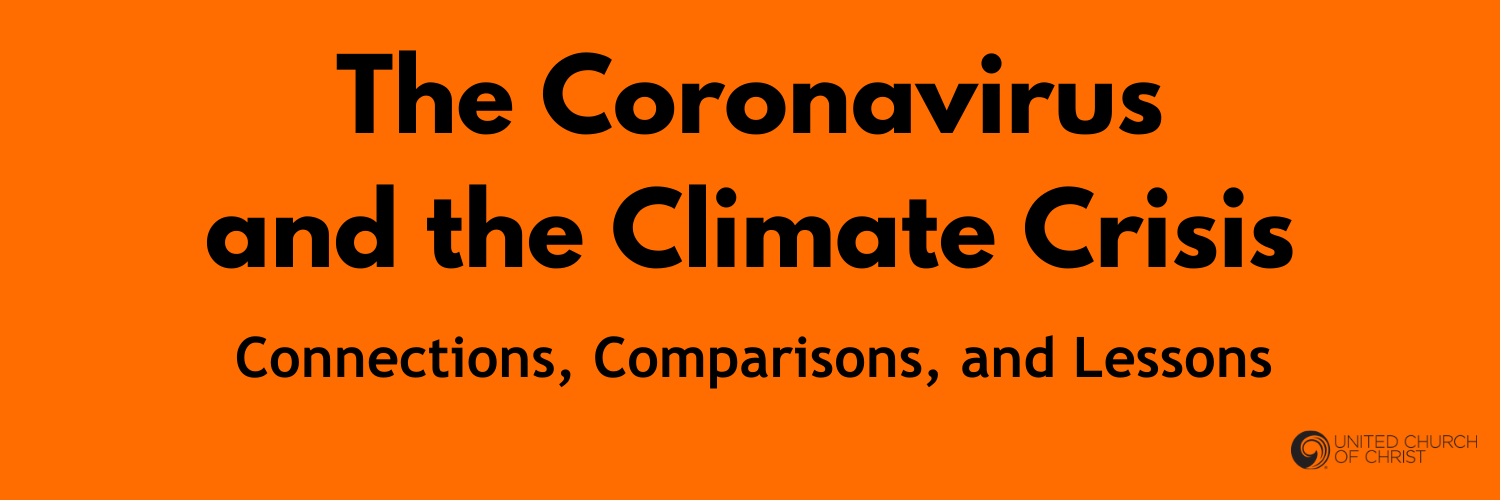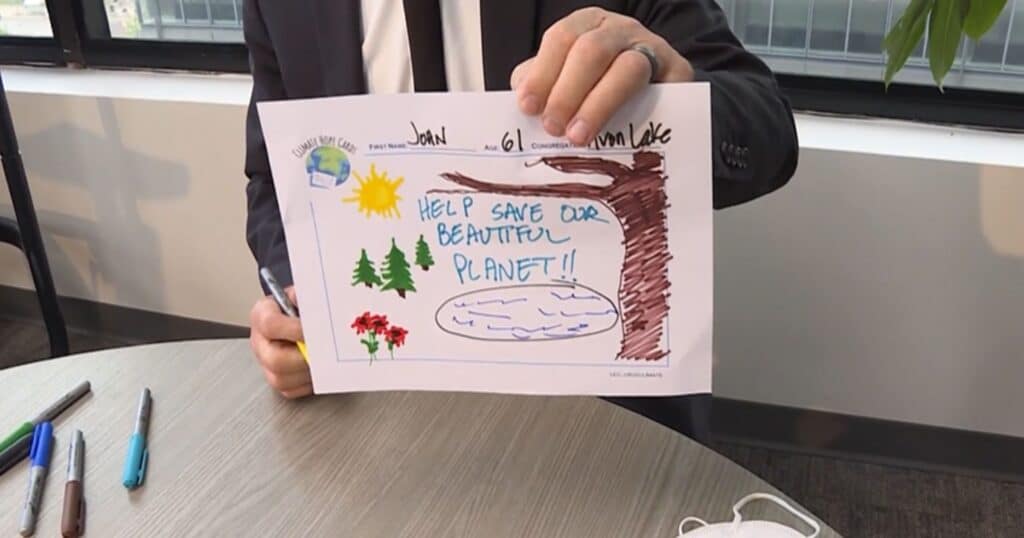Connecting the Coronavirus and Climate Change

The following remarks were offered as part of a webinar panel on the coronavirus and the climate crisis. The remarks were entitled “Parishioner’s Perspective on the Connection between the Coronavirus and Climate Change.”
Through my work with Interfaith Power and Light which is under the umbrella of the NC Council of Churches and the Green Sanctuary movement in the Unitarian Universalist Association, I have seen the response of folks in the pews to good leadership from the pulpits on Climate Change. I must confess that I am sorry to not see more of it from ALL denominations, although I think we are moving in that direction thanks to Pope Francis’ Encyclical nearly 5 years ago and many other writings by clergy like those represented on this panel. I would also like to see more Eco theology taught in all the seminaries, but that is for another discussion.
I have also seen what leadership is like from the secular groups that I serve like the NC Sierra Club, the NC “No Drill” Coalition and the US Climate Action Network. Although the Big Greens are now on track with an Environmental Justice perspective on climate change, Justice has not always been at the forefront of their campaigns. But, the Faith – based communities consider our actions on these topics of Climate Change and Pandemics as first and foremost, a moral imperative. I do not know of a single religion or faith that doesn’t have the basic tenets of “Caring for Creation” and “Caring for the Least Among Us”.
The Power of speaking from the heart and soul, rather than the head, is our moral mandate as a Faith Community. What does that mean and what does that look like as we live through a Pandemic and make the connections between this time and the Climate Crisis which have already been laid out so well by the other speakers? May I remind you of Margaret’s opening words? She said:
“YES, Science matters and how we treat the natural world does indeed affect our well-being. YES, the sooner we mobilize for Action, the less suffering will take place and we DO have the ability to make drastic changes very quickly. And YES, All of us are vulnerable, though unequally. And she answered the question of What can we do in these times? Her answer in brief is to “Hold on to a vision of a just, peaceful, and sustainable Earth which will give us strength for the Future.”
When I was teaching Environmental Science at our local community college, I was working through the curriculum from my head. I have often thought about the sub-title to the textbook I used which was “The Way the World Works”. That seemed like something every human being should strive to know and I was there to help my students figure it out. I can talk the talk of 412 ppm of CO2 gas in the atmosphere, but, I don’t know how much difference that talk has made over the last 50 years. Of course, we have made headway using the tools of Science, but when human beings are faced with an existential crisis like climate change or a Pandemic, I am finding that appealing to folks through their heart rather than their head might be the better way to go. NCIPL calls this “Advocating with Compassion”. Sharing with people about what we all love and care about the most seems to bring us together to a mutual goal much faster than ppm of Greenhouse Gases. I usually begin with comparing notes about what our children or our grandchild likes to do when they come home for a visit. Walking on the beach and swimming in the ocean becomes a common theme that can then move to changes that could happen, if we decided to drill for oil offshore, which then moves to renewable energy rather than more fossil fuel infrastructure.
Just last night, on the evening news, with the Presidential report on the Corona Virus, I noticed how frequently the speakers used the words “community” and how we had to take care of each other by following the new rules of social distancing. Was this appeal based on Science? Yes, most definitely. But did the Science win us over or did the message about caring for our community, “for the least among us and the most vulnerable “. This is what I mean when I compare these two existential threats. What we find is true for one also holds true for the other. At some point we can and must bring together the Political will and God’s will to move forward on these major issues. I feel the Church has the grassroots capacity to demand from our leaders a political stance that moves us forward with hope-filled solutions for the time ahead.
We, as the church community and all faith- based communities across the world have the moral imperative and the mandate to speak from our hearts about these kinds of existential threats and I hope and pray we will do so.
I want to share another short story about the strength of this type of moral imperative. Abby Hopper was the Secretary of the Interior under President Obama. When he was considering opening the East Coast to offshore oil leasing and seismic blasting, in the spring of 2016, President Obama sent Dr. Hopper to Raleigh, NC, where our then Republican Governor, McCrory made his pitch in favor of opening our Coastline to drilling. Dr. Hopper spent the morning with the Governor and his economic development fellows and the Big Greens spent the afternoon with her sharing the opposing point of view. At the end of the discussion, the NC Sierra Club asked her the question, “What more information can we provide for you?” Her answer took them all by surprise….She asked where the faith based community stood on this issue in NC? That was brought back to the NO Drill Coalition and me as a member of NCIPL . I told our NCIPL Director who then met with the Governing Board of the NC Council of Churches two days later where they unanimously passed a resolution against drilling and seismic blasting. This Board is comprised of 26 distinct Judicatories from 18 different denominations representing 1.5 million Christians in our state. After sending this Resolution and a cover letter to Abbey Hopper, the following week, President Obama pulled NC from the plan to drill on the eastern seaboard. Do we have Grassroots power? Yes! And we need to use it more readily to align God’s will with the political will. It will take both to accomplish the task before us!
I’d like to end with a question that I always asked my students when we finished the Environmental class and final exam. The question comes from a very beautiful poem by Mary Oliver called “The Summer Day”. And the question is: “What will you do with your one wild and precious life?” And that is what I ask of you today….What will you do with your one wild and precious life?
Related News
The Racial History of a Church’s Land
In 1859, Oregon joined the Union as the only free state with an exclusion clause in its...
Read MoreThe UCC’s 2025 Climate Hope Art Contest
Register your church now! For the third straight year, the UCC is conducting a...
Read MoreFinding Faith in Cancer Alley
Cancer Alley is the nickname given to 80 miles of the Mississippi between Baton Rouge and New...
Read More

